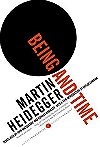Admittedly, I haven't read the whole of this book. However, I have read large pieces of it.
This is Heidegger's attempt to define being, which is a topic left undiscussed since Plato and Aristotle back in the opening moments of western philosophy. Interestingly enough, he never comes to a conclusion on this. However, he discusses humanity a lot and what being is to humans because, afterall, we use 'being' everyday and must have some concept of what it is to be. His conclusion is one that the Existentialists loved and utilized extensively. He concludes (having digressed from his original topic) that humans have no inherent nature like other animals. Instead, we create our own nature through the decisions that we make. We are the only beings that ask what and how we should be.
This read can be extremely dense and difficult. A knowledge of phenomenology and cartesian philosophy (and, maybe, some history of philosophy) is necessary. However, its knowledge, its response to Cartesian thought, and its inspiration to Existentialism makes is a very worthwhile read.
|
Points: 340
relearningAdd relearning as a friendrelearning will be notified and will have to accept this friendship request, to view updates from relearning and their ratings you must follow them. |
Lists
|
|
Recent reviews
All reviews -
Books (1)
Being and Time review
 Posted : 16 years, 3 months ago on 15 February 2009 04:16
(A review of Being and Time)
Posted : 16 years, 3 months ago on 15 February 2009 04:16
(A review of Being and Time) 0 comments, Reply to this entry
0 comments, Reply to this entry
Books
Top rated |
 My books page My books page Rated 28 books Rated 28 books |
DVDs
Top rated |
 My dvds page My dvds page Rated 4 dvds Rated 4 dvds |
 Login
Login
 Message
Message
 Home
Home 1 Lists
1 Lists 1 Reviews
1 Reviews Collections
Collections





